This article was co-authored by Chris M. Matsko, MD and by wikiHow staff writer, Christopher M. Osborne, PhD. Dr. Chris M. Matsko is a retired physician based in Pittsburgh, Pennsylvania. With over 25 years of medical research experience, Dr. Matsko was awarded the Pittsburgh Cornell University Leadership Award for Excellence. He holds a BS in Nutritional Science from Cornell University and an MD from the Temple University School of Medicine in 2007. Dr. Matsko earned a Research Writing Certification from the American Medical Writers Association (AMWA) in 2016 and a Medical Writing & Editing Certification from the University of Chicago in 2017.
wikiHow marks an article as reader-approved once it receives enough positive feedback. This article received 11 testimonials and 80% of readers who voted found it helpful, earning it our reader-approved status.
This article has been viewed 1,171,938 times.
Hair loss is a frustrating problem and it may seem like there is nothing you can do about it. Although genetics play the biggest role in hair loss, there are some factors that you can control. You may be able to speed up your hair growth by taking certain supplements, trying home remedies, or making changes to your diet and lifestyle. If you are bothered by your hair loss or nothing you try seems to help, then it is a good idea to talk to your doctor. Your doctor may be able to identify the cause of your hair loss and devise a treatment plan based on your condition.
Steps
Using Supplements
-
1Take a daily multivitamin. Getting the right balance of vitamins and minerals every day may help to promote faster hair growth. Taking a daily multivitamin can help to provide you with all of the essential vitamins and minerals that you need, which can be great insurance if you do not always follow a healthy diet.
- Find a vitamin that includes no more than 100% of the daily recommended allowance of all vitamins and minerals. Check the label to see these percentages.
- Make sure that the supplement contains biotin. Biotin has been shown to help with hair regrowth in some studies.
-
2Get more vitamin C. Vitamin C may also help to promote faster hair regrowth when taken as a supplement. Try taking 500mg to 1,000mg of vitamin C twice per day. You can also increase your vitamin C intake by consuming more vitamin-C-rich foods, such as citrus fruits, peppers, and cantaloupe.Advertisement
-
3Include an omega-3 supplement. Omega-3s may help support faster hair regrowth when taken daily. Take one to two capsules daily. Check with your doctor first if you are taking any medications. Omega-3s can interact with certain medications, such as blood thinners.
-
4Consider taking a B-complex vitamin. Stress can be a contributing factor in hair loss. Taking a B-vitamin complex may help to reduce your stress levels and possibly even promote faster hair regrowth. You can take one B-complex tablet per day. Make sure that you read and follow he manufacturer's instructions as well.
-
5Look into L-lysine supplements. L-lysine has been shown to promote hair regrowth in some studies when taken on a daily basis.[1] Try taking 500 to 1,000 mg of L-lysine daily to help promote faster hair regrowth.
- Do not take L-lysine along with a calcium supplement or calcium-rich foods. L-lysine can cause you to retain excess calcium in your blood.
Trying Other Alternative Therapies
-
1Massage your scalp with essential oils. Unlike most other “natural” remedies, there is some evidence that massaging your scalp with certain essential oils may help to stimulate faster hair regrowth. You can also look for shampoos with essential oils, such as a tea tree oil shampoo.
- To use an essential oil massage, add a couple of drops of thyme, rose, lavender, and cedarwood essential oils to one tablespoon of jojoba or grapeseed oil. Stir the oils together well.
- Then, apply the oil mixture to your scalp and massage it into your skin.
- Leave it in for about 10 to 15 minutes and then rinse it out with warm water.
- Repeat this treatment once per day.
-
2Try rubbing coffee into your scalp. One study found that a caffeine-infused shampoo helped to stimulate hair growth when it was left on for about two minutes.[2] You may be able to achieve similar results by pouring lukewarm coffee on your scalp and allowing it to sit for about two minutes.
- Brew some coffee and then let it cool down to room temperature. Then, pour some of the coffee onto your scalp. Wring out any excess coffee from your hair and then wrap a towel around your head or put on a shower cap.
- Wait for two minutes and then rinse the coffee out of your hair with warm water.
- Repeat this treatment daily.
-
3See an acupuncturist. Acupuncture therapy may help to stimulate faster hair regrowth as well. Acupuncture is a form of traditional Chinese medicine that uses needles placed in strategic locations to unblock energy pathways.
- Make sure that you find a qualified acupuncturist who has had experience working with people suffering from hair loss.
Changing Your Diet
-
1Eat more fruits and vegetables. Make sure that your diet include plenty of antioxidant-rich fruits and vegetables to support your health and possibly even promote hair regrowth. Some good types of fruits and vegetables to include are:
- Cherries
- Blueberries
- Tomatoes
- Squash
- Peppers
-
2Drink plenty of water each day. Staying hydrated is important for overall good health and it may also help with hair loss. Make sure that you drink between six and eight glasses of water every day to stay hydrated.
- If you are physically active or sweating, then you will need to drink more water to stay hydrated.
-
3Consume more high-quality protein. Red meat is higher in cholesterol and saturated fat than other protein sources, so it is best to limit your intake of red meat. Instead, stick to lean sources of protein such as skinless poultry, fish, tofu, and beans to give your body (and scalp) the protein that it needs.
-
4Steer clear of potential allergen foods. Allergens may effect different parts of your body and possibly even slow hair growth. If you have a known food allergy, make sure that you are not consuming anything that contains that food as an ingredient. If you suspect that you may be allergic to something, then you may want to ask your doctor about an allergy screening. Identifying any food allergies can help you avoid foods that may be contributing to your hair loss. Common food allergies include:
- Dairy
- Wheat
- Corn
- Soy
- Food additives
- Preservatives
-
5Reduce your intake of processed and trans-fat-heavy foods. Eating healthier foods and laying off of unhealthy foods may help to reduce your hair loss as well. Try to eliminate the following foods from your diet:
- French fries and other fried foods
- Prepackaged baked goods, crackers, cookies, and chips
- Refined foods such as white sugar, flour, bread, pasta, and rice
- Margarine
Making Lifestyle Changes
-
1Get plenty of rest. The amount of sleep that you get each night may contribute to hair loss or just make it harder for your hair to grow. Try to get seven to nine hours of sleep every night. If you have trouble sleeping, talk to your doctor.
-
2Manage your stress. Stress may contribute to hair loss in some people as well. If you are often stressed, then try to develop some healthy ways to manage those feelings. Some good options include:
- Practicing yoga
- Meditating
- Doing deep breathing exercises
- Calling a friend
-
3Exercise more. Getting regular exercise is important for good health and it may also help to prevent further hair loss. Aim for 30 minutes of exercise five days out of every week.
- If it is hard for you to fit in 30 minutes, then try splitting your exercise up into two or three short workouts throughout the day. For example, you could do two 15 minute sessions or three 10 minute sessions spread throughout the day.
-
4Quit smoking. Smoking has been linked with increased hair loss in men with hair loss.[3] If you smoke, now is a great time to quit. Ask your doctor for information about medications and smoking cessation programs in your area that may help you to quit.
-
5Limit your alcohol intake. Drinking alcohol has also been linked with hair loss in men.[4] Try to limit your alcohol intake to two drinks per day if you are a man or one drink per day if you are a woman, or less.
- If you have trouble limiting your alcohol intake, talk to your doctor. Drinking in excess can cause serious health problems in addition to hair loss, such as high blood pressure, certain types of cancer, and depression.[5]
Seeking Medical Treatment
-
1See a doctor. If making changes to your diet and lifestyle or using other remedies does not seem to help, then see your doctor. It is also a good idea to see your doctor to rule out the chance of a serious medical condition.[6]
- Your odds of having a condition like lupus are low, but hair loss can be a symptom of this disease, so it may ease your mind to consult your doctor for possible testing.
- If the reason for your hair loss is known but it is causing you stress, talking to your doctor can be of benefit as well. Establishing the specifics of your particular condition can help your doctor to determine the best treatment options available.
-
2Try minoxidil. Minoxidil (known by the brand name Rogaine, but now widely available without prescription) is a topical lotion that can be used by men and women. It works better on thinning hair than on hairless spots, and must be used continuously in order to keep any beneficial effects going.[7]
- Minoxidil has about a 35% success rate at stimulating hair growth.
- Men and women can use minoxidil.
-
3Consider taking finasteride. Finasteride (known as Propecia) is a prescription pill that stops the conversion of testosterone into DHT, which is a major cause of male pattern baldness. It works best on thinning hair, and must be used continuously to keep up any hair regrowth.[8]
- Finasteride has about a 66% success rate, but it should only be used by men.
- Finasteride can cause birth defects, so women who are or may become pregnant should never use or handle the medication.
-
4Look into implants. In addition to medications, surgical options have improved as well. Hair plugs or skin graft surgeries may be an option for you. With this procedure, small portions of skin from the back of your head (with hair still growing on them) will be implanted onto your bald spots.[9] Talk to your doctor if you think that this might be a good option for you.
-
5Find out about laser therapy. Low-power laser therapy treatments have shown some early promise as well.[10] Low-powered laser therapy has been shown to increase hair thickness and improve the condition of those suffering from hair loss. Ask your doctor if this option might help with your condition.
-
6Wear a wig or hairpiece while you seek treatment. Hair loss can make you feel self-conscious and affect your confidence, so you may want to look into getting a wig or hairpiece while you seek treatment for hair loss. You insurance may even cover the cost of a wig or hairpiece, which will allow you to get a high-quality, realistic looking wig or hairpiece.[11]
Expert Q&A
Did you know you can get expert answers for this article?
Unlock expert answers by supporting wikiHow
-
QuestionI am 18 years old and am getting bald spots all over my head. I have psoriasis, a thyroid problem, and lack of iron. Will my hair grow back?
 Chris M. Matsko, MDDr. Chris M. Matsko is a retired physician based in Pittsburgh, Pennsylvania. With over 25 years of medical research experience, Dr. Matsko was awarded the Pittsburgh Cornell University Leadership Award for Excellence. He holds a BS in Nutritional Science from Cornell University and an MD from the Temple University School of Medicine in 2007. Dr. Matsko earned a Research Writing Certification from the American Medical Writers Association (AMWA) in 2016 and a Medical Writing & Editing Certification from the University of Chicago in 2017.
Chris M. Matsko, MDDr. Chris M. Matsko is a retired physician based in Pittsburgh, Pennsylvania. With over 25 years of medical research experience, Dr. Matsko was awarded the Pittsburgh Cornell University Leadership Award for Excellence. He holds a BS in Nutritional Science from Cornell University and an MD from the Temple University School of Medicine in 2007. Dr. Matsko earned a Research Writing Certification from the American Medical Writers Association (AMWA) in 2016 and a Medical Writing & Editing Certification from the University of Chicago in 2017.
Family Medicine Physician
-
QuestionHow can I grow hair naturally on a bald spot?
 Chris M. Matsko, MDDr. Chris M. Matsko is a retired physician based in Pittsburgh, Pennsylvania. With over 25 years of medical research experience, Dr. Matsko was awarded the Pittsburgh Cornell University Leadership Award for Excellence. He holds a BS in Nutritional Science from Cornell University and an MD from the Temple University School of Medicine in 2007. Dr. Matsko earned a Research Writing Certification from the American Medical Writers Association (AMWA) in 2016 and a Medical Writing & Editing Certification from the University of Chicago in 2017.
Chris M. Matsko, MDDr. Chris M. Matsko is a retired physician based in Pittsburgh, Pennsylvania. With over 25 years of medical research experience, Dr. Matsko was awarded the Pittsburgh Cornell University Leadership Award for Excellence. He holds a BS in Nutritional Science from Cornell University and an MD from the Temple University School of Medicine in 2007. Dr. Matsko earned a Research Writing Certification from the American Medical Writers Association (AMWA) in 2016 and a Medical Writing & Editing Certification from the University of Chicago in 2017.
Family Medicine Physician
Warnings
- Always check with your doctor before you start taking any supplements or making other major changes to your diet.⧼thumbs_response⧽
References
- ↑ http://www.ncbi.nlm.nih.gov/pubmed/12190640
- ↑ http://www.ncbi.nlm.nih.gov/pubmed/24341477
- ↑ http://www.ncbi.nlm.nih.gov/pubmed/24341477
- ↑ http://www.ncbi.nlm.nih.gov/pubmed/24341477
- ↑ http://www.cdc.gov/alcohol/fact-sheets/alcohol-use.htm
- ↑ http://www.mayoclinic.org/diseases-conditions/hair-loss/basics/definition/con-20027666
- ↑ http://www.mayoclinic.org/diseases-conditions/hair-loss/basics/treatment/con-20027666
- ↑ http://www.mayoclinic.org/diseases-conditions/hair-loss/basics/treatment/con-20027666
- ↑ http://www.mayoclinic.org/diseases-conditions/hair-loss/basics/treatment/con-20027666
About This Article
To promote faster hair growth if you have a bald spot, you can try taking a daily multivitamin to make sure you’re getting all the nutrients you need. If you’re not getting enough vitamin C, talk to your doctor about using a supplement or getting more vitamin C from your diet. Omega-3 supplements can also help. Additionally, stress can contribute to hair loss, so consider taking B-complex vitamins to help manage it. Finally, ask your doctor about taking L-lysine to help your hair regrow. For more advice from our Medical co-author, including how to try alternative therapies for hair loss, keep reading!

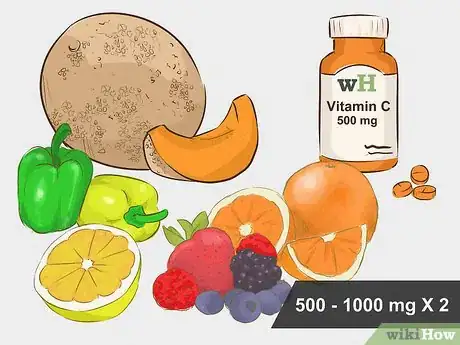
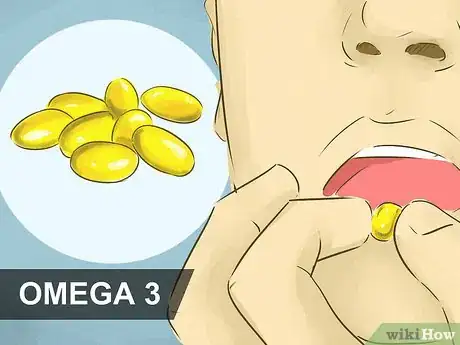



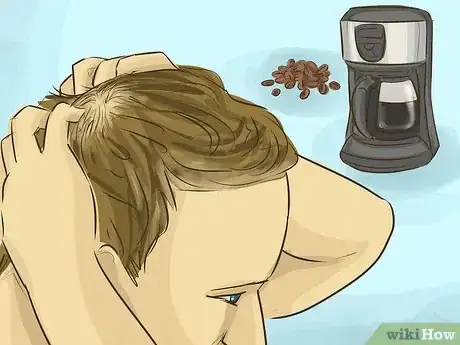















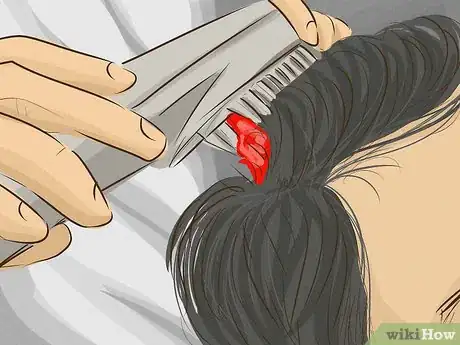
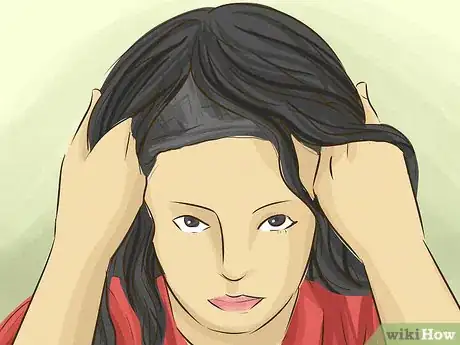


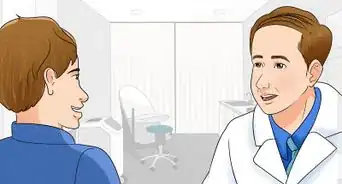
-Step-11.webp)
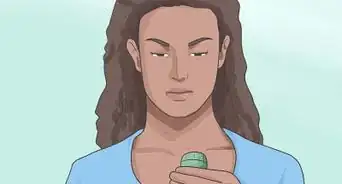


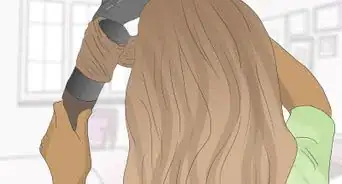
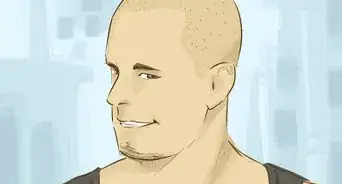
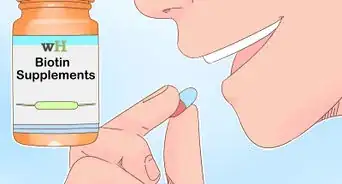
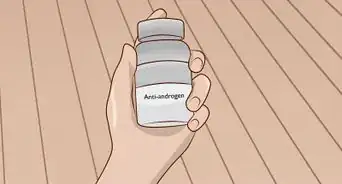
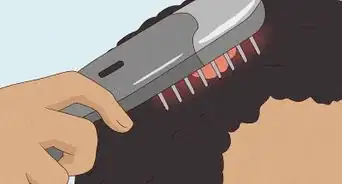













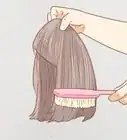

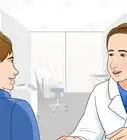
-Step-11.webp)


































